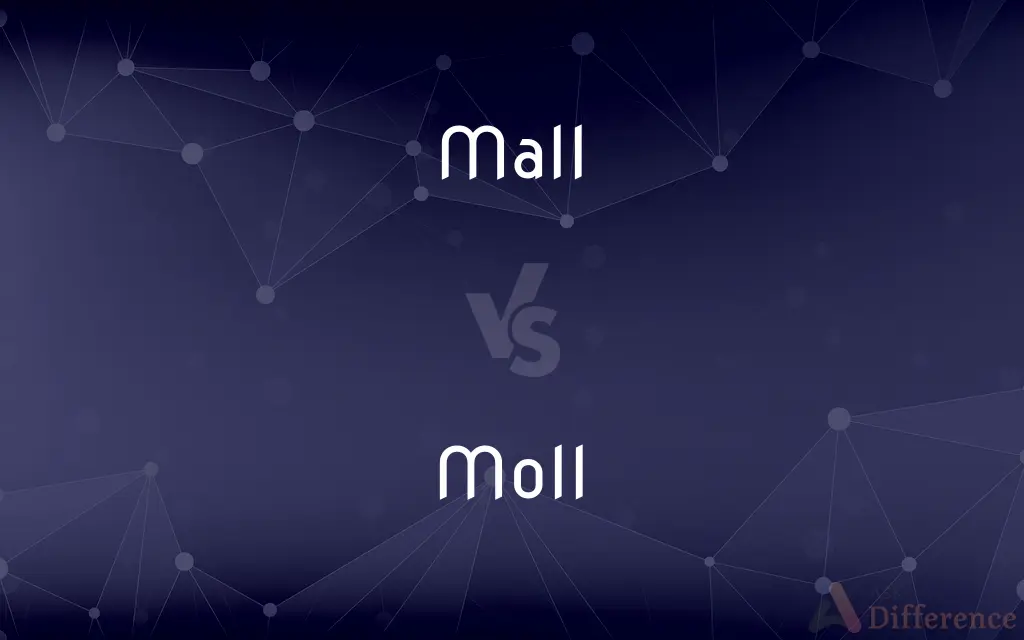Mall vs. Moll — What's the Difference?
Edited by Tayyaba Rehman — By Urooj Arif — Updated on April 4, 2024
Malls are large shopping centers with various stores, while molls are female companions to criminals in gangster settings.

Difference Between Mall and Moll
Table of Contents
ADVERTISEMENT
Key Differences
Malls, often expansive, are designed for shopping, dining, and entertainment, hosting a wide range of stores and services under one roof or in a complex. They serve as a one-stop destination for consumers looking to fulfill multiple needs in a single visit. Molls, on the other hand, have historical roots in early 20th-century gangster culture, referring to the female companions of gangsters. These women were often portrayed as deeply involved in the criminal undertakings of their partners or the gang.
While malls are architectural and commercial establishments that cater to the public, offering a variety of goods and services, molls play a role primarily in historical and cultural contexts, symbolizing a certain lifestyle or character type within criminal circles. The term "moll" is not used in a commercial or physical sense but rather describes a person's role or identity.
Malls are characterized by their commercial nature, aiming to attract a wide audience for shopping and leisure activities. They are part of the retail industry and have evolved to include not just shops but also entertainment options such as cinemas, play areas, and food courts. Molls, conversely, are characterized by their association with criminal activities and their portrayal in media and literature, highlighting their role within gangster narratives rather than any commercial activity.
The environment of malls is designed to be welcoming and safe for families, individuals, and groups seeking a variety of experiences, from shopping to dining and entertainment, in a controlled and designed space. In contrast, the environment associated with molls is often depicted as dangerous, secretive, or part of the criminal underworld, emphasizing their association with illegal activities and the gangster lifestyle.
Malls contribute significantly to the economy by providing employment opportunities, boosting retail sales, and serving as community hubs. Molls, however, are figures from a bygone era, serving more as cultural icons or characters within stories that depict the life of crime and the dynamics within gangster societies.
ADVERTISEMENT
Comparison Chart
Definition
A large retail complex
Female companion to a criminal
Purpose
Shopping, dining, entertainment
Association with criminal activities
Nature
Commercial and public
Personal and historical
Environment
Designed, safe, and welcoming
Often associated with crime and secrecy
Cultural Significance
Symbolizes consumer culture
Represents a bygone criminal era
Compare with Definitions
Mall
A center for commercial and leisure activities, offering a wide range of services.
The mall boasts over 100 stores, a food court, and a children’s play area.
Moll
A symbol of the intertwining of femininity and criminality in cultural narratives.
The exhibition explores the image of the moll in popular culture.
Mall
A public space for shopping and socializing, often with multiple levels.
We spent the afternoon walking around the mall and window shopping.
Moll
A female associate or companion of a gangster, often involved in criminal activities.
The notorious moll was known for her loyalty to the gang leader.
Mall
An architectural space designed to accommodate a large number of retail stores.
The architect designed the mall to have natural lighting and open spaces.
Moll
A term from early 20th-century gangster culture, referring to a woman in the criminal underworld.
In the film, the moll played a crucial role in the gang's operations.
Mall
A large enclosed shopping area with various stores and entertainment options.
The new mall downtown includes a movie theater and a bowling alley.
Moll
A character type in literature and films, representing women associated with criminals.
The novel features a complex moll who is torn between love and loyalty.
Mall
A retail and entertainment complex attracting people for various needs.
The mall is our go-to place for last-minute shopping and dining out.
Moll
A historical figure within organized crime, often romanticized or vilified.
She was one of the most famous molls of the prohibition era.
Mall
A large, often enclosed shopping complex containing various stores, businesses, and restaurants usually accessible by common passageways.
Moll
A woman prostitute.
Mall
A street lined with shops and closed to vehicles.
Moll
A female companion of a gangster, especially a former or current prostitute.
Mall
A shady public walk or promenade.
Moll
Bitch, slut; an insulting epithet applied to a female.
Mall
Chiefly Upstate New York See median.
Moll
A girlfriend of a bikie.
Mall
A pedestrianised street, especially a shopping precinct.
Moll
A girlfriend of a surfie; blends with pejorative sense.
Mall
An enclosed shopping centre.
Moll
(slang) A female fan of extreme metal, grunge or hardcore punk, especially the girlfriend of a musician of those aforementioned genres.
Mall
(obsolete) An alley where the game of pall mall was played.
Moll
Minor; in the minor mode
A moll, that is, A minor
Mall
A public walk; a level shaded walk, a promenade.
Moll
Minor; in the minor mode; as, A moll, that is, A minor.
Mall
A heavy wooden mallet or hammer used in the game of pall mall.
Moll
The girl friend of a gangster
Mall
(obsolete) The game of polo.
Mall
(obsolete) An old game played with malls or mallets and balls; pall mall.
Mall
To beat with a mall, or mallet; to beat with something heavy; to bruise
Mall
To build up with the development of shopping malls
Mall
(informal) to shop at the mall
Mall
A large heavy wooden beetle; a mallet for driving anything with force; a maul.
Mall
A heavy blow.
Mall
An old game played with malls or mallets and balls. See Pall-mall.
Mall
A place where the game of mall was played. Hence: A public walk; a level shaded walk.
Part of the area was laid out in gravel walks, and planted with elms; and these convenient and frequented walks obtained the name of the City Mall.
Mall
Formerly, among Teutonic nations, a meeting of the notables of a state for the transaction of public business, such meeting being a modification of the ancient popular assembly.
Councils, which had been as frequent as diets or malls, ceased.
Mall
A public access area containing a promenade for pedestrians; as, to gather near the Washington monument on the mall in Washington.
Mall
The paved or grassy strip between two roadways.
Mall
A shopping area with multiple shops and a concourse for predominantly or exclusively pedestrian use; in cities the concourse is usually a city street which may be temporarily or permamently closed to motor vehicles; in suburban areas, a mall is often located on a convenient highway, may be large, contained in one building or in multiple buildings connected by (usually covered) walkways. Also called shopping mall
Mall
To beat with a mall; to beat with something heavy; to bruise; to maul.
Mall
A public area set aside as a pedestrian walk
Mall
Mercantile establishment consisting of a carefully landscaped complex of shops representing leading merchandisers; usually includes restaurants and a convenient parking area; a modern version of the traditional marketplace;
A good plaza should have a movie house
They spent their weekends at the local malls
Common Curiosities
What is a mall?
A mall is a large retail complex containing various stores, restaurants, and entertainment facilities under one roof or in a coordinated area.
Can the term moll have a positive connotation?
Historically, the term moll often carries negative connotations due to its association with criminality, though it can be neutral or even positive in some cultural representations.
What does moll mean?
Moll refers to a female companion or associate of a criminal, especially within the context of early 20th-century gangster culture.
Are malls only found in urban areas?
While malls are commonly found in urban and suburban areas, they can also be located in rural areas, serving as shopping and entertainment hubs.
How do malls differ from traditional marketplaces?
Malls differ from traditional marketplaces by being enclosed, offering a wide range of goods and services, and providing amenities such as parking and climate control.
What are the economic impacts of malls?
Malls contribute to the economy by providing employment, stimulating retail sales, and attracting tourism.
What role do molls play in gangster narratives?
Molls often play crucial roles in gangster narratives, either as key supporters of their criminal partners or as pivotal characters in their own right.
Can malls be cultural landmarks?
Yes, some malls become cultural landmarks due to their architectural significance, historical importance, or role as community centers.
What types of stores are typically found in a mall?
Malls typically host a variety of stores, including clothing, electronics, beauty products, home goods, and specialty shops.
How do malls accommodate the needs of diverse shoppers?
Malls accommodate diverse shoppers by offering a wide range of products and services, accessible facilities, and amenities like food courts and entertainment options.
What draws people to stories about molls?
People are drawn to stories about molls due to their intrigue, the allure of the criminal world, and the complex dynamics of loyalty, power, and gender within these narratives.
What is the historical significance of molls?
Molls hold historical significance as part of the cultural depiction of organized crime, especially in the early to mid-20th century, reflecting gender roles within criminal contexts.
How has the portrayal of molls changed in media over time?
The portrayal of molls in media has evolved from one-dimensional characters to more complex figures, reflecting broader changes in societal views on gender and morality.
Are there modern equivalents to molls in today's society?
While the specific term "moll" is dated, modern equivalents might include individuals involved in criminal activities with their partners, though the dynamics and perceptions have evolved.
How do environmental designs differ between malls and traditional shopping areas?
Malls are designed with modern amenities, controlled environments, and architectural aesthetics in mind, unlike traditional shopping areas that may prioritize accessibility and historical integration.
Share Your Discovery

Previous Comparison
HTTP vs. WWW
Next Comparison
Deduce vs. InduceAuthor Spotlight
Written by
Urooj ArifUrooj is a skilled content writer at Ask Difference, known for her exceptional ability to simplify complex topics into engaging and informative content. With a passion for research and a flair for clear, concise writing, she consistently delivers articles that resonate with our diverse audience.
Edited by
Tayyaba RehmanTayyaba Rehman is a distinguished writer, currently serving as a primary contributor to askdifference.com. As a researcher in semantics and etymology, Tayyaba's passion for the complexity of languages and their distinctions has found a perfect home on the platform. Tayyaba delves into the intricacies of language, distinguishing between commonly confused words and phrases, thereby providing clarity for readers worldwide.
















































